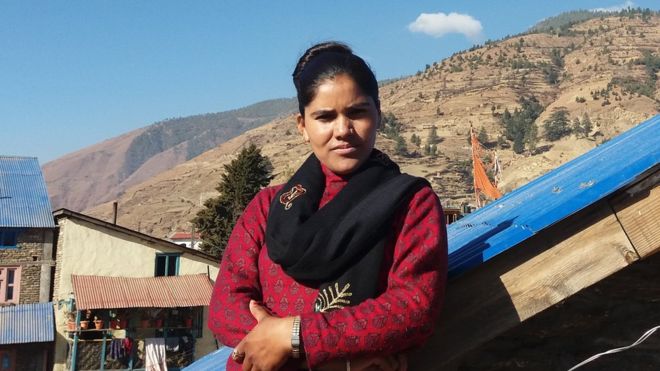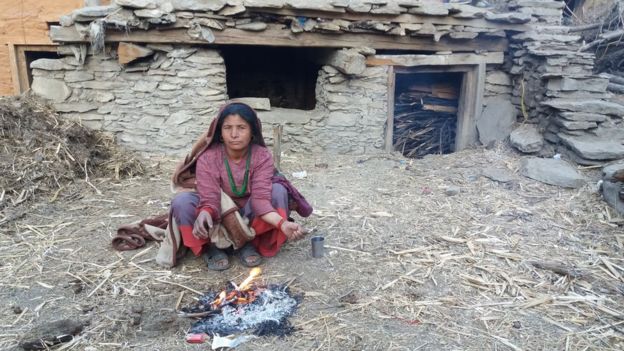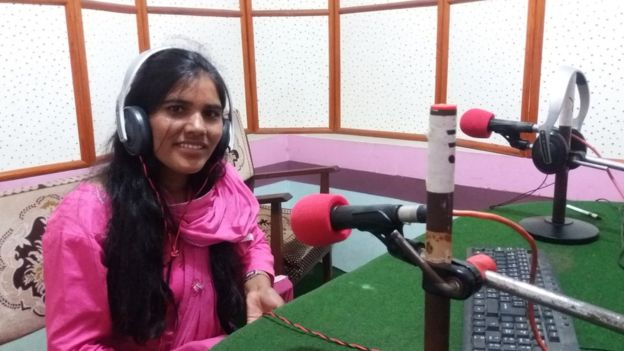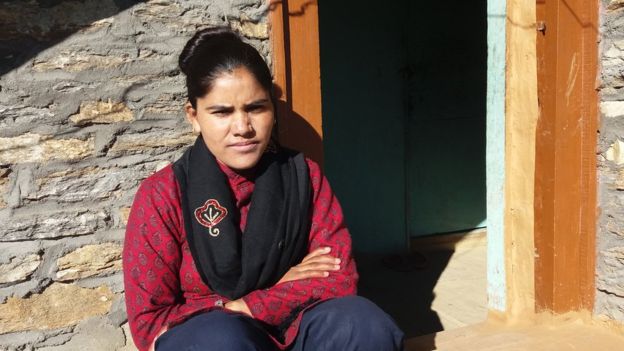We have copied and translated the following article – originally published at BBC News – because we consider it important that our Catalan and Spanish-speaking readers understand the text properly.
— be artsy team
An ancient Hindu tradition in which menstruating women are banished to an outhouse is under the spotlight in Nepal after the death of a 15-year-old girl. The practice was banned in 2005 but still continues in western areas. BBC Nepali reporter Krishnamaya Upadhayaya, 24, describes how she has fought against the tradition, known as chhaupadi.

I started menstruating when I was 12. My mother, sisters and sisters-in-law used to stay outdoors in a mud hut when they were menstruating so I started staying there too. I was always afraid of what would happen. I was scared of insects and wild animals.
I was told it was a sin to touch books during menstruation so I did not go to school during the three days of my period. I used to wonder why I was not allowed to touch books. I missed school and I wasn’t the only one. Many girls in my village faced the same problem.
Even today, menstruating women are not allowed to enter their courtyard for seven days and are not allowed to consume dairy products like milk, butter, yoghurt etc. I was very hurt when I was not allowed to enter my own courtyard. During your period, people don’t hand you food, they fling it at you. The belief that you must not touch your elders during menstruation still persists.

And I still had to deal with it when I moved from Kutari village to Khalanga, the capital of Jumla district, to go to college when I was 17.
When I went looking for a room to rent, the landlord asked me if I had begun menstruating. When I truthfully replied that I had, I was turned away. I wanted to cry, I did not know what to do. If I went back home, I would miss my studies but it looked like I would not find a room to rent.
Period taboos
- In many world religions, women are seen as impure during their period
- They are restricted from entering places of worship and following religious rites
- The chhaupadi tradition followed by Hindus in western Nepal is the most extreme version where women are banished outside during their monthly cycle
- In India, women are not allowed enter some Hindu temples and Muslim mosques while menstruating but there have been court cases to overturn this
- In southern India, a girl reaching puberty is celebrated with a party and presents
- In the Dogon tribe in Mali, women of the village also live in a hut during their period
Finally, I found a room where the landlord said he would allow me to live on the ground floor, but not on the first floor of the house. I agreed to live on the ground floor (as far away from the others and as close to the door as possible).
But there were problems. I was not allowed to touch the water tap during my period so someone would have to give me water. I had read that you should maintain hygiene during your period so I used the inside toilet, even though the landlord asked me not to and wanted me to go outside.

After spending a month in Khalanga, I started working in radio. I learned more and more about menstruation. When my landlord complained that my menstruation was creating problems for him, I moved. Usually women are not allowed to rent the upper floor in Jumla because they menstruate. This belief persists even among educated people.
It has been six years since I started working in radio. I stay in my room during my period. But I do not tell anyone, including my landlord, that I am menstruating, because I am afraid that I will be sent to a shed. One person cannot end a social ill that has been passed down for generations. Change cannot happen unless society accepts it.
When I go home to my village, I stay in the house during my period. I stay in my own room. I do not enter the kitchen and prayer room. After protesting many times to my family, I have been able to stay inside the house rather than outside in a mud hut. I hope that one day the chhaupadi tradition, like the Sati tradition (of a widow immolating herself on her husband’s pyre), will end.

I am very sad to hear of women losing their lives due to the chhaupadi tradition in the mid and far western regions of Nepal. Even in my district, a lot of women live in sheds, so the same thing could happen here too. The government needs to do more to educate people. Chhaupadi is banned but mindsets have not changed.
Please remember that we are still raising funds for Rato Baltin at http://www.migranodearena.org/en/challenge/13821/higiene-menstrual-en-nepal—chhaupadi—rato-baltin/
Every donation helps!
